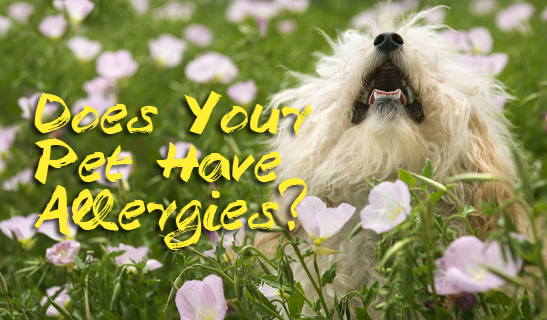
Does Your Pet Have Seasonal Allergies?
Spring is in the air, and so are allergens like pollens, mold and fungal spores! It is during this time of year that we start to see an increase in canine and feline allergies. But is the cause really from seasonal allergies or could it be something else? The first step is to determine what type of allergy your pet is actually suffering from. In this article we are going to look at the different types of allergies, the symptoms to look for and what do to help your pet deal with them.
Your cat or dog doesn’t know they have spring fever or are allergic to their collar, they just know that they are very uncomfortable and just like we humans do, they can have congestion, sneezing fits, watery eyes and runny noses! They can also be in discomfort from having itchy and irritated skin.
As a result, pets are usually inclined to find relief by scratching, grooming, licking and rubbing on objects. Excessive amounts of these behaviors will only accentuate the problem, which could lead to secondary health issues such as bacterial or yeast skin infections, which can cause hair loss, scabs and crusts on the skin. It’s important to be able to recognize and respond to your pet’s allergies, so that you can get them the appropriate treatment and avoid any additional complications.
What are some of the causes of pet allergies?
There are generally four primary causes for allergic responses in cats and dogs:
- Atopic Allergies – These are allergies due to environmental factors both outside and in the home. These can also be allergies to seasonal occurrences, like blooming flowers, trees, or grass, or they can be year round, with allergies to dust, mold, or mildew.
- Flea Allergy Dermatitis – Most pets will find fleas uncomfortable and irritating however, additionally some pets also experience an allergic reaction to the flea’s saliva, which is left behind during the biting process, and will develop a more advanced and serious skin irritation.
- Contact Allergies: Contact allergies are caused by a pet coming in contact with an irritant, often something like a detergent, cleaning agent residue or certain coatings on fabrics, collars, clothing etc.
- Food Allergies – Just as in humans, different foods and food types can affect cats and dogs as well. If you suspect that your pet has allergies or they are exhibiting symptoms, the best course of action would be to visit your veterinarian and have them diagnose your pet’s symptoms. Food allergies can be hard to isolate and the process takes time, so it is often advisable to rule out the other possible allergy causes first.
How to tell if your canine or feline companion is suffering from allergies?
Some signs include:
- Unusual redness in eyes — Allergens entering through the eyes can cause conjunctivitis (inflammation of the tissue inside the eyelid) and Scleritis (inflammation of the whites of the eyes) often accompanied with eye discharge, your pet may also exhibit squinting and rubbing their eyes with paws or on surfaces.
- Runny nose and sneezing — Just as in humans, when allergens enter the nasal passages, they can cause immediate irritation and physical reactions.
- Ear scratching, head shaking— The ear canal and the inner pinna (ear flap) can accumulate allergens, become inflamed, and cause discomfort. Typical signs of ear irritation include: ear discharge, redness, excessive scratching and rubbing on available surfaces. Pets having ear inflammation are more prone infection with bacteria or yeast, which are often already present in the ear canal and the natural moist, dark conditions within the ear canal make a good environment for these cultures to grow in.
- Scratching, licking, and chewing – Allergies can manifest themselves as Dermatitis (skin inflammation), which typically forces animals to provide themselves relief by way of licking, chewing and scratching the irritated areas. Excessive amounts of these activities can also cause the development of areas of severe inflammation, infection, and hair loss called pyotraumatic dermatitis (“hot spots”).
- Coughing and gagging— Allergens that make their way in through the nasal passage also end up in the mouth and throat. Allergens that are inhaled can also irritate the lungs and cause respiratory issues.
What should I do if I think my pet is suffering from seasonal allergies?
- Visit your vet — There are many conditions that can appear clinically similar to allergies, so having your veterinarian do a proper examination is an important first step. They will also be able to better determine whether the allergy is seasonal, food or flea-based in nature. Diagnostics, including a skin examination, blood testing, and others methods can be employed to properly identify the condition and recommend the most appropriate treatment options.
 Bathing and topical treatments — General bathing or localized cleaning can help wash away environmental allergens, bacteria and other irritants. Try to using a pet-specific shampoo formulated for inflamed or sensitive skin. Talk to your veterinarian. They may be able to recommend and prescribe a topical treatment or leave-on skin conditioners that can help manage your pet’s skin irritation and/or infection.
Bathing and topical treatments — General bathing or localized cleaning can help wash away environmental allergens, bacteria and other irritants. Try to using a pet-specific shampoo formulated for inflamed or sensitive skin. Talk to your veterinarian. They may be able to recommend and prescribe a topical treatment or leave-on skin conditioners that can help manage your pet’s skin irritation and/or infection.
- Keep your pet’s area clean – Try keeping the spots in your place where your pet spends the majority of their time as free from allergens as possible. Cleaning and vacuuming the floors with a heap-filtered vacuum cleaner and his bedding on a regular basis using non-toxic house cleaning agents.
- Eye rinses and ear cleaning — If your pet is exhibiting allergy symptoms in their eyes or ears you may want to rinse out any environmental irritants and allergens. Often times a typical eye drops/rinse designed for humans will work fine on your pet’s eyes. Applying a few drops of eye irrigating solution is sometimes one of the easiest and direct ways of removing allergens from your pet’s eyes. In certain cases a more specific, specialized treatment may be advisable so talk to your vet about the best course of action. If your pet is a swimmer, or frequently gets their head wet, it’s a good idea to wipe excess water from their ears post- activity to help ensure that moisture doesn’t linger.
- Diet and general health— Most allergic reactions are essentially an immune system response, so it’s important to keep your pet’s immune system functioning at the highest level possible. Talk to your veterinarian about formulating a diet that will be better for keeping a healthy immune system in your pet and work towards reducing inflammation.
